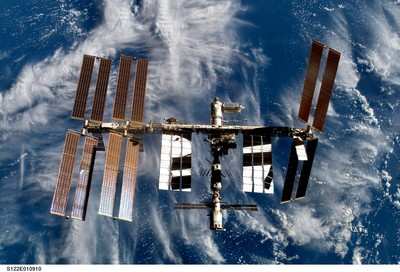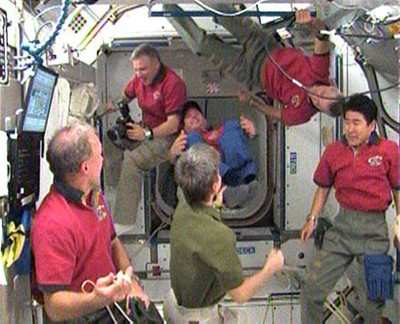The Ultimate LEO-Home Makeover?
Most of us carry fond memories of our first apartment, or of
living in the dorm at college. Regardless of its condition, the
sheer freedom that first "home away from home" represented more
than made up for any shortcomings in available room, or
amenities... though likewise, most of us also happily remember the
day we moved into better digs. Crews onboard the International
Space Station will soon experience some of those feelings, too.

For the past six years, ISS Expeditions have lived in the
low-earth-orbital equivalent of a cramped three-bedroom dorm --
with a small kitchenette, and somewhat problematic plumbing and
waste collection services. Crews onboard the station couldn't
complain, of course -- in addition to the out-of-this-world view,
the ISS is already much larger than any previous US or Russian
space station.
That was just the beginning, however. Following this month's
visit by the space shuttle Endeavour, the ISS will be expanded into
a five-bedroom, two-bath residence with all the latest gizmos NASA
could think of.
The Associated Press reports astronauts onboard STS-126, set to
liftoff Friday night, will install an extra toilet, as well as
additional sleep compartments with, among other niceties,
individual thermostats and laptop computer ports. A new kitchenette
will be added as well, to supplement the existing equipment;
astronauts will also receive a new exercise machine.
Those are wonderful enhancements, to be sure... but they pale in
importance when compared with other new equipment to be
installed.
The station will also receive a water recycling filter and
recovery system, capable of turning urine and condensation into
potable drinking water. STS-126 commander Christopher Ferguson says
the new recycling system is the single most important piece of
equipment the mission will carry.
"This is really it, and it has no parallel," he said. "I would
challenge you to find any other system on the Earth that recycles
urine into drinkable water. It's such a repulsive concept that
nobody would even broach it... But that day will come on this
planet, too, where we're going to need to have these technologies
in place, and this is just a great way to get started."
That said, Ferguson admits he hasn't yet tried any 'recycled'
drinking water. "Are you crazy? I would never try that," Ferguson
joked. "No, no, no, no, actually, you know what? If they offered me
a sample, I would do it."
Former ISS crewmember Donald Pettit is returning to help connect
the new equipment... and he took a philosophical tack to his
mission. "It's going to take yesterday's coffee and make it into
today's coffee," Pettit said. The new system is expected to be up
and running by Spring 2009.
Another piece of equipment will be vital to crew morale: a
refrigerator. The lone icebox onboard the station now is reserved
for experiments; the new one will finally allow crews to enjoy cold
beverages.
"It seems kind of trivial, but six months of lukewarm orange
juice can kind of bum you out," said Expedition 18 crewmember
Sandra Magnus, who will fly to the station on Endeavour for her 3
1/2 month stay.

All the enhancements are aimed towards expanding the station's
typical crew complement from three, to six. The first six-person
crew is scheduled to be onboard the station by June, and will
ultimately include specialists from Canada, Europe, and Japan.
"Imagine for a moment that we have an international space
station in orbit that we've invested in and we don't have any US
crews on board. That's what the partners live with today," said ISS
program manager Mike Suffredini.
 ANN's Daily Aero-Term (04.26.24): DETRESFA (Distress Phrase)
ANN's Daily Aero-Term (04.26.24): DETRESFA (Distress Phrase) ANN's Daily Aero-Linx (04.26.24)
ANN's Daily Aero-Linx (04.26.24) Airborne 04.22.24: Rotor X Worsens, Airport Fees 4 FNB?, USMC Drone Pilot
Airborne 04.22.24: Rotor X Worsens, Airport Fees 4 FNB?, USMC Drone Pilot Airborne 04.24.24: INTEGRAL E, Elixir USA, M700 RVSM
Airborne 04.24.24: INTEGRAL E, Elixir USA, M700 RVSM Airborne-NextGen 04.23.24: UAVOS UVH 170, magni650 Engine, World eVTOL Directory
Airborne-NextGen 04.23.24: UAVOS UVH 170, magni650 Engine, World eVTOL Directory




